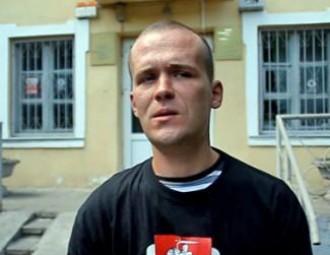Young opposition activist Vasil Parfiankou got released from jail

Young 29 year-old political activist completed his six-month term in Baranavičy on Saturday and returned home, getting warm welcome from his friends and supporters.
Let us recall that Parfiankou was one of the 28 people who were sentenced to prison terms in connection with their participation in a post-election protest staged in Minsk on the night of December 19, 2010. He was the first of them to stand trial. In February 2011, he was sentenced to a four-year prison term. Parfiankou was granted a presidential pardon on August 11, 2011 and released three days later.
After his release, he was repeatedly arrested and punished under the Civil Offenses Code for participating in unsanctioned demonstrations, recalls BelaPAN.
In January 2012, a district judge in Minsk placed the young man under police supervision after the police claimed that he "has not stepped on the path of reformation" and "has repeatedly disturbed the public peace."
Parfiankou was ordered to report to a probation officer once a week and stay at home between 8 p.m. and 6 a.m. unless he was required to be at his workplace, and prohibited from leaving Minsk on personal business without police permission.
On May 29, 2012, Parfiankou was found guilty of failure to comply with the restrictions imposed on him and sentenced to six months in jail. The public prosecutor in the case said that the young man had been absent from home without a good excuse and had been found guilty of a civil offense twice within a year.
On July 24, a judge of the Minsk City Court upheld the sentence and ruled that Parfiankou should stay at home waiting to be sent to jail. He was placed in the jail on Valadarskaja Street in Minsk on August 9 and transferred to the Baranavičy jail a week later.
-
03.01
-
07.10
-
22.09
-
17.08
-
12.08
-
30.09








































